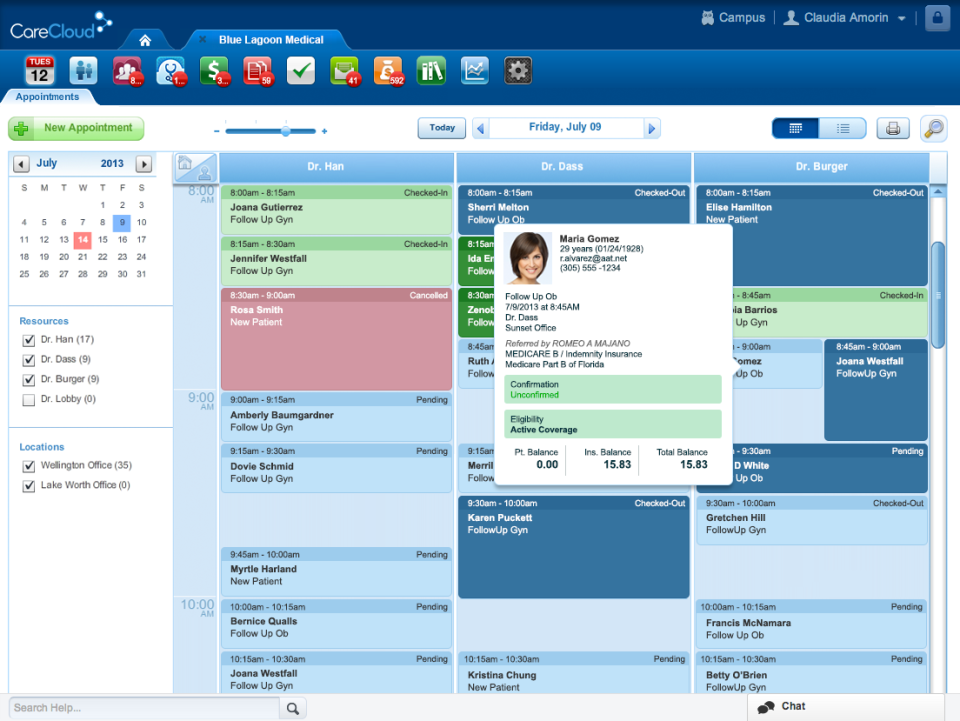Every business needs efficient processes, but this need becomes even more pronounced in healthcare. That’s because efficiency improves the quality of care and how well physicians can engage with patients.
Two major players that provide comprehensive solutions for practice management, electronic health records (EHR), and billing services are CareCloud and Athenahealth. These platforms offer a range of tools designed to improve operational efficiency, enhance patient care, and optimize financial health for medical practices. However, the differences in their offerings, target audiences, and pricing models make each platform suitable for specific needs.
This post delves into the core features, pros and cons, pricing, and target audiences of CareCloud and Athenahealth, providing a clear comparison to help healthcare professionals make informed decisions about what software to use.
The core features of CareCloud vs Athenahealth
CareCloud shines with its robust analytics and reporting tools, complemented by comprehensive revenue cycle management services. These features are crucial for practices that aim to enhance operational efficiency and financial performance. CareCloud’s platform is intuitive, offering a seamless experience in handle EHR, practice management, and billing processes. The platform has a user-friendly interface and customizable features, making it a preferred choice for small to medium-sized practices.
On the other hand, Athenahealth is recognized for its ability to serve practices of all sizes, with an emphasis on larger organizations. Its billing and revenue cycle management services are among the best in the industry, designed to reduce administrative burden and improve financial outcomes. Plus, Athenahealth’s network-enabled approach provides valuable insights and benchmarks against other practices, which is a significant advantage for organizations trying to improve their competitiveness.
Both platforms offer excellent customer support, ensuring that practices can resolve issues promptly and keep their operations running smoothly.
Pricing and plans
Pricing structures for CareCloud and Athenahealth vary according to the size of the practice and the specific services required. CareCloud offers tailored pricing plans that cater to the unique needs of businesses of all sizes, making it an attractive option for practices looking for flexibility and scalability. Athenahealth offers customizable solutions and has minimal upfront costs and no long-term contracts, which can be great for organizations that don’t feel ready to commit to a specific solution.
The pros and cons of CareCloud vs Athenahealth
Athenahealth and CareCloud both offer a range of EHR features that can streamline practice management, but let’s see how they stack up when placed side by side.
CareCloud pros
- It features robust analytics and reporting tools.
- It has a customizable and user-friendly interface.
- It’s an excellent option for small to medium-sized practices.
CareCloud cons
- It may be less well-suited for large practices.
- Some features might require additional training for practices to maximize their benefits.
Athenahealth pros
- It’s ideal for practices of all sizes, especially larger ones.
- It boasts superior billing and revenue cycle management services.
- Network-enabled insights allow for performance benchmarking.
Athenahealth cons
- It’s more expensive than other options, reflecting its comprehensive features.
- The platform’s extensive capabilities might present a steeper learning curve for some users.
Choosing the best platform for your healthcare organization
CareCloud is often the go-to choice for small to medium-sized practices that value flexibility, ease of use, and powerful analytics. Its platform is designed to grow with practices, making it a viable solution for those looking to scale their operations over time.
Athenahealth, with its robust feature set and network-enabled services, is tailored for practices of all sizes but is particularly beneficial for larger organizations that can fully leverage its billing, revenue cycle management, and benchmarking capabilities. Its ability to provide insights and comparisons across its extensive network makes it a powerful tool for practices aiming for top-tier performance and patient care.
Enhancing your EHR system with Jotform
Jotform is another helpful, HIPAA-friendly tool for managing medical practices. It offers an array of medical form templates for patient intake, consent, telehealth, feedback, and more. Jotform employs security features like 256-bit SSL encryption, access controls, and more. Your healthcare business can use Jotform alongside CareCloud and Athenahealth to improve medical practice operations. You can simplify onboarding new clients with patient registration forms and use pre-session questionnaires and post-session feedback forms in telehealth sessions. In short, Jotform simplifies administrative tasks, enhances client communication, and streamlines operations for health and wellness practitioners to improve client care. Try it for free today.
Photo by National Cancer Institute on Unsplash










































































































Send Comment: